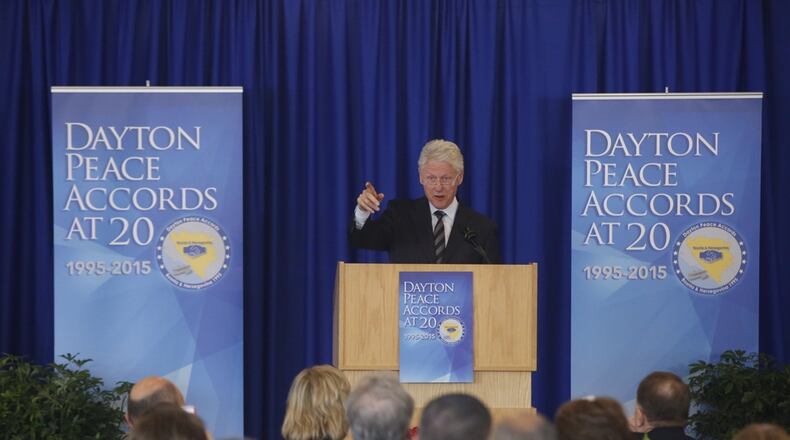Clinton’s administration played a pivotal role in forging an enduring peace between warring factions.
“We’re back here to celebrate one victory in what has turned out to be an ongoing contest across the globe between violence and negotiation, cooperation and conflict, inclusion and winner-take-all politics,” the former president said.
“There is still a lot of work to do … to reap the full promise of Dayton,” he said.
Clinton lauded a bill introduced in Congress Thursday to create a new enterprise fund to bolster the economy of Bosnia-Herzegovina. U.S. Sen. Jeanne Shaheen, D-N.H., and U.S. Sen. Roger Wicker, R-Mississippi, are the sponsors.
“We don’t have a great deal of time because the headlines are being grabbed by larger more immediate crises that affect more people,” Clinton said, “but the truth is Bosnia is just as important as it ever was. It is the canary in the coal mine in terms of Europe’s potential to be united, free, democratic and at peace for the first time since nation states arose on the European continent. We made it 20 years, but we have more to do.”
The peace deal was reached after three weeks of talks in November 1995 at the Hope Hotel at Wright-Patterson Air Force Base. The peace deal halted more than three years of war among Bosnian, Croatian and Serbian forces that left more than 200,000 dead in a genocide in the Balkans in southeastern Europe.
The university is hosting a two-day conference with key players in the deal to look back at the historic accords and reflect on what’s still needed. Retired Army Gen. Welsey Clark, who was one of those key players, traveled to Dayton to mark the anniversary.
Several other participants have died, such as Bosnian President Alija Izetbegovic, Serbian President Slobodan Milsoevic, Croatian President Franjo Tudjman, U.S. Secretary of State Warren Christopher and Assistant Secretary of State Richard C. Holbrooke.
A memorial plaza to Holbrooke was dedicated in Dayton this week.
Clinton said the world has become more interdependent in the two decades since the agreement, and he made a call to action for citizens to get involved.
“Most of us are not in government,” he said. “Most of us have no control over national security decisions or even local police forces. But we still are citizens in the battle for an inclusive force, an inclusive economics, inclusive politics, inclusive societies,” he said. “And winning over the long run depends not just on stopping bad things from happening … we also have to make good things happen.”
The road to peace had to have a role for all those engaged in war, he said.
“It seems to me flawed though it was, the Dayton agreement proves that after people have spent a good deal of time hating each other, fighting each other, and killing each other, you have to have inclusive politics, and it’s amazing how much resistance there is to it,” he said.
Clark said he had been warned that others who tried to bring peace to the conflict had lost careers over the failure to secure peace. “But I couldn’t help it,” he said. “I saw what was going on over there.”
The former NATO supreme allied commander said the plan was to bring the factions of each side to Wright-Patterson to force them to face issues that were obstacles to peace at a place where they would be isolated.
Sarajevo Mayor Ivo Komsic remembered that isolation Thursday as “one of the curiosities of those negotiations.”
Dayton Mayor Nan Whaley said the peace deal has meant an enduring legacy between the city and the people of Bosnia-Herzegovina.
“This is a relationship that is long-term for Dayton with Bosnia-Herzegovina and I think when we do these celebrations and have these discussions over two days that we’re in this for the long term,” she said.
Dzeneta Begic is one of three Dayton Peace Accord fellows from Bosnia-Herzegovina at the University of Dayton. She was hopeful Clinton’s visit and the two-day reunion of key players in the accords would bring further change and peaceful progress in her homeland and overcome obstacles to its integration into the European Union. “Hopefully, we’ll get some results (from) these conferences, some decisions,” she said.
The three students briefly met Clinton. “It was short, but very sweet,” said Begic, 21. “I was very nervous.”
Ashley Webb, 44, was an Army captain who served with a multinational peacekeeping force in Bosnia-Herzegovina three years after the accords were reached.
Webb attended the celebration Thursday with Dayton Rotary Club exchange student Armin Ljescanin, 17, a Bosnia-Herzegovina native who is a Fairmont High School junior.
“I wanted to learn more about America, about Ohio, about the people here so I can bring something from here to Bosnia there and make another change possible,” Lescanin said.
In Bosnia, Webb was stationed at Camp Bedrock near the city of Tuzla. “What was most telling for us was even three years after the peace accords had been signed and the war was over was just to go through and see the destruction,” he said.
Many homes of those in the ethnic minority were destroyed, but rebuilding continued, he remembered.
“There was a lot of hope, there’s also a lot of fear that things would fall through and they would be back in the same kind of turmoil that they were in during the war,” he said.
About the Author
